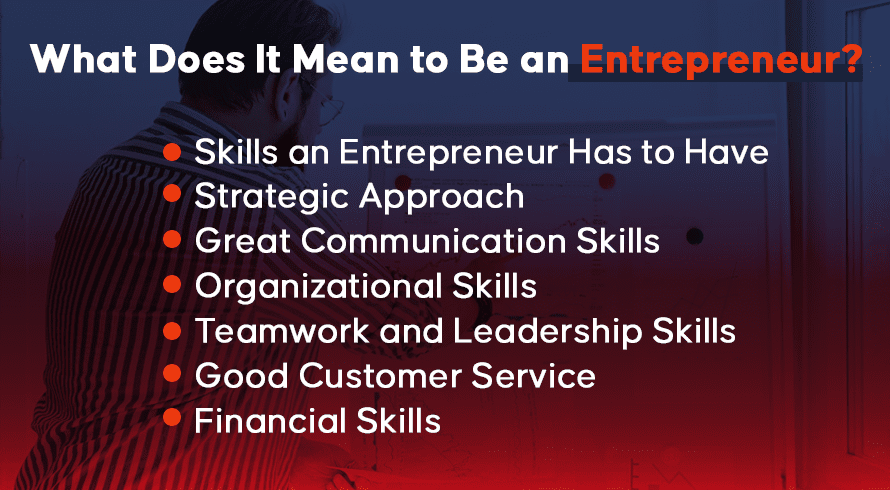Inquivix HQ
1-903, 18 Eonju-ro 146-gil,
Gangnam-gu, Seoul, Korea
06057

Entrepreneurs create businesses as a solution to address a need or problem that other businesses have not yet come up with. Entrepreneurs put extensive work, and hours into these others and most often follow a business plan to guide them as they navigate the phase of trying to establish their venture.
This blog will explore entrepreneurship, what a business plan is, how it can guide entrepreneurs and what entrepreneurs must do after they create a business plan. Keep reading to learn more.
What Is a Business Plan?
Before you dive into what an entrepreneur has to do after creating a business plan, you need to know what a solid business plan should contain. In the event an entrepreneur cannot fund the initial development of the business, the business plan serves as the tool to attract financing from potential investors. This is the foundation to successful businesses, and therefore entrepreneurs create business plans to understand why the business needs to enter the market, the business goals – short-term and long-term objectives, and the target market of the business.

Other key elements of the business like a value proposition, mission statement, organizational structure, and well-conducted market research help entrepreneurs identify the business’ competitive advantage, funding requirements and develop financial projections to include in the business plan. A detailed plan will serve as a step-by-step guide as to how entrepreneurs intend to carry out the launch of their new venture.
There are two types of business plans. A traditional business plan, and a lean startup plan. A traditional business plan is comprehensive and will have a complete, detailed outline of the business, and its needs – from an executive summary up to the detailed findings of complete market analysis, and much more. A lean startup plan focuses more on key elements and has a more brief description. Lenders and investors generally require traditional business plans to analyze how well-thought an entrepreneur’s business plan is.
Importance of Having a Business Plan For Entrepreneurs
A business plan forces entrepreneurs to analyze their business idea, its strengths, and shortcomings. This is a critical factor that helps establish a successful business. As an entrepreneur identifies and addresses these shortcomings, they can target their problems practically, set realistic goals according to a workable timeline. If you’re looking for insights on your business idea, simply stating what you have in mind won’t be helpful in receiving quality insight and advice. A business plan with information about what your expectations are from your employees and how they will be compensated for their work, or a well-out-lined marketing strategy will help the business gain valuable insight.

A viable business plan will also be your initial guide as to how you implement the distribution strategy of your resources, how you intend to produce your products and services if you need an office, and once you have this pinned down, you see if your new business is set to make a loss or profit. Having such a well-thought-out plan, enables entrepreneurs to have a great headstart, and also identify the goals that they need to be working towards – both short and long-term goals. These milestones keep entrepreneurs heading in the right direction. If you are looking for investors for your own business, a good business plan might sometimes be the sole reason angel investors (who provide capital for start-ups) find your business worthy of being invested in. A good business plan will act as your portfolio of social entrepreneurship and help your raise money for your business.
What Does It Mean to Be an Entrepreneur?
An entrepreneur identifies gaps in the market – a product or service that has not been introduced- and uses the opportunity to create a new business idea. A good entrepreneur will conduct the necessary market research to learn about the niche, the feasibility of the business, and if the business can expect sales and secure market share.
Many entrepreneurs fantasize about having their own business and being their own boss but do not put in the necessary work to understand what they are getting into, create a business plan to analyze the feasibility of their business venture and this leads them down a grim path. Entrepreneurship includes discipline and a futuristic thought process. Entrepreneurs that are constantly creating new businesses, a marketing plan for them, and selling these businesses are called serial entrepreneurs. Entrepreneurs seize market opportunities by creating a business tailored to the needs of a target market.

Skills an Entrepreneur Has to Have
Entrepreneurship is no easy feat, and it requires a great deal of skill to become a successful entrepreneur. We have outlined important skills an entrepreneur has to possess to achieve business success.
Strategic Approach
Entrepreneurs need to be strategic once they have understood the potential strengths, weaknesses, threats, and opportunities their business venture possesses. A skillful entrepreneur will ensure to have a secure business plan that provides the data for them to create different strategies – distribution strategy, marketing strategy, and other strategies to evaluate and improve business performance. They also analyze and understand how other businesses have a competitive advantage over them, and apply strategic approaches to prepare their business for existing and potential competitors.
Great Communication Skills
Entrepreneurs need to have great communication skills, which build customer relationships that are necessary to secure potential customers. It also helps them market their business plan to investors, to receive a business loan, or even helps them sound convincing in their efforts to apply for personal loans or bank loans. Good communication skills are a marketing strategy that plays an important role in business success.
Organizational Skills
Being organized helps an entrepreneur allocate time to their tasks, and ensure that they are being highly productive. For example, if they own a small business, it serves as a vital part of their small business administration, as it showcases their high focus on work ethic to employees and customers. Using business plans is also a great way to stay organized and manage time effectively.

Teamwork and Leadership Skills
Just how an entrepreneur is organized is a positive trait that employees will see, and practice, it is important for the leader to practice before preaching. If you want your team to be punctual, you need to be punctual. You get the idea!
Clearly communicating the expectations of the team, listening to their ideas, suggestions, and concerns before making a careful decision will reinforce their importance to your business. A good leader ensures that the work mood stays positive, and employees don’t have resignation running at the back of their minds.
Good Customer Service
Good customer service is more than just communicating pleasantly with them. Keeping track of customer feedback regarding your products and services, and carefully implementing these will help your business stand apart from other businesses in your niche. Regardless of whether you are a small business owner, a new business in the market, a lean startup – none of this matters to your consumers as much as good customer service. Take feedback seriously and serve them well.
Financial Skills
Entrepreneurs need to be able to understand all the financial information they are dealing with. From understanding what a balance sheet is, to how they can create a cash flow statement, or in layman’s terms simply understanding their costs, and profits need financial skills. Company plans all depend on the financial health of the business, and not being able to gauge this will hinder the success of the business, will show as a great flaw in your business plan, and also be detrimental to your funding requirements.
Create a Business Plan – What Next for an Entrepreneur?
At this point, you have created your own business plan – whether it is a traditional business plan or a lean startup plan. Congratulations! Successful entrepreneurs take their business plans seriously, and they never regret them. Now that you have completed this vital step, what should you do after you create your business plan? We’ve gathered a list of things entrepreneurs can do to take their business ahead.

Research (Do Your Homework!)
Having a business plan should not stop you from researching. It is important to know what else is out in the market, what new markets are available, what your competitors are doing, and what the expectations of your target market are. Assuming that other businesses promoting the same products and services do not exist will put your business – out of business. Researching keeps you aware of other products and services similar to yours, and it can help you improve what you provide, enhance your value proposition, strategize and apply competitive advantages to make your business stand out to potential customers.
Educate Yourself from the Experts
Look at famous entrepreneurs that grew their small businesses that had their own funding requirements from investors to become venture capitalists! However successful entrepreneurs do not have to be ‘famous’ to the world, and taking advice from an entrepreneur that you know, who is successful and is easily reachable can help you constantly evaluate your business, products, and services.
Know Your Finance and Accounting
Like we said before, it’s a skill that will make sure you do not lose out on business opportunities. Have a financial plan in place before you start your business, separate your personal funds from your business funds, and never confuse the two. Open bank accounts, and other financial outlets specifically for your business. It helps entrepreneurs keep their financial projections in check, analyze their performance according to these financial projections and alter their operations accordingly.

If you feel your financial skills are lacking, educate yourself and develop these skills. Do not resort to hiring financial help, especially if you own a small business and it is out of your budget. Regardless of whether they are able to hire external financial services or not, entrepreneurs should not rely on them and need to know their finance and accounting.
Put Together a Qualified Team
An entrepreneur should put together a team of professionals to make sure their target market receives quality products and services. Your team should possess their own set of talents, skills, and areas of expertise. A quick tip when hiring would be to hire employees that have more skills deployed in areas that you lack. Team members should not expect you to micromanage them, and therefore need to be independent in their work. Be proactive, and take measures to hire a legal consultant for your business, to foresee and handle any legal concerns that may arise. Don’t forget these as criterias in your business plan, as they will guide you when hiring employees.
Refine Your Branding
Branding is crucial to your business because even if your products and services are amazing, and you have a solid business plan unless you create a brand for your business, the success rate of your business is going to be static. Make people start talking about your products and services, by creating brand awareness. Associate your brand with feelings and stories that are relatable to your consumers. This relatability draws them in, and it helps establish a brand image that people find memorable.

Market Your Business
Once your business plan is done, you need to make people aware of the existence of your business. Entrepreneurs can use the different platforms available online and even traditional platforms like television, press releases, and others to market their business. Entrepreneurs should be mindful of the platform’s policies and adhere to them.
Using the business plan, entrepreneurs can understand the competitive advantages their business has. Subtly promoting these competitive advantages in marketing campaigns to show consumers what they receive better, and showcasing these marketing campaigns in diverse platforms, and innovative ways will help entrepreneurs market their business successfully.
Be Prepared for an Unpredictable Ride
Entrepreneurs can have a solid business plan, perfect financial statements, good branding and marketing, a detailed description, and an understanding of their target market but still encounter unpredictable obstacles or opportunities. These can be tackled with great strategizing skills, and the ability to not be taken aback. Having a plan B, and even a plan C will always be helpful for entrepreneurs, and even if they don’t use these plans, expecting unpredictable circumstances will help entrepreneurs have an upper hand when they do finally arise.
Conclusion
Business plans are great tools for entrepreneurs to establish what they want their business to look like and plan how they will achieve this. Entrepreneurs can simply take a business plan template off the net, and fill in the gaps with information about their business from simple things like a mission statement, to extensive evaluations like financial projections. By understanding what creating and running a business will look like for them, entrepreneurs can easily find out what to do to take their business further once they have created a business plan.

Entrepreneurs can research and be up to date with industry trends, market overviews, and other necessary data that helps them evaluate and improve the performance of their business. Entrepreneurs should educate themselves from experts, and take advice and insights from other entrepreneurs that have established firms. While the idea of self-employment pleases entrepreneurs, they need continuously increase their knowledge and skills, from vital finance and accounting skills, to how they can conduct effective branding and marketing for their business. Using set requirements and expectations of employees specified in their business plan, entrepreneurs can also high a qualified team of professionals to run the business.
All in all, the business plan is the foundation for entrepreneurs looking to start their own businesses. Once they have created a business plan, they can put to use the practices outlined in this blog to become a successful business owner. Are you an entrepreneur and if so are you ready to create your business plan to start your own business?
